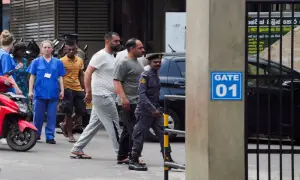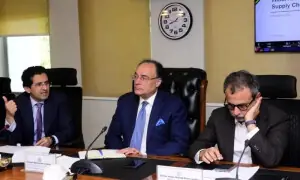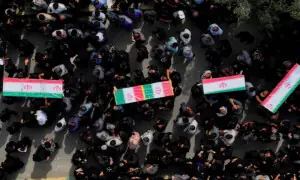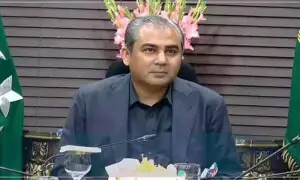Indian hackers spied on Pakistani politicians, generals: report
3 min readAn India-based computer hacking gang snooped on Pakistani politicians, generals, and diplomats among other targets in various parts of the world, a report by The Bureau of Investigative Journalism and the Sunday Times revealed on Sunday.
The investigation revealed the contents of a leaked database from inside one of the major gangs of hackers, targeting businesses, politicians, and journalists.
The report said that more than 100 victims had their private email accounts targeted by the gang “on behalf of investigators working for autocratic states, British lawyers and their wealthy clients”.
“The gang seized control of computers owned by Pakistan’s politicians, generals and diplomats and eavesdropped on their private conversations, apparently at the behest of the Indian secret services,” the report said, adding that the most famous Pakistan-related target was Pervez Musharraf.
It said that several political targets seem to have arisen from the continued tensions between India and Pakistan.
The investigation revealed that the gang was tasked, on January 10, 2022, with breaking into the email account of Fawad Chaudhry, the then minister of information and took a screenshot of Chaudhry’s inbox.
A database revealed the hacking of a dozen lawyers, journalists and famous people from 2019 “commissioned by one particular client”, the newspaper and the bureau said in a statement.
The newspaper alleges that the hacking was masterminded by a 31-year-old accountancy firm employee, who denies the claims.
Based in a suburb of the Indian tech city of Gurugram near Delhi, his network of computer hackers allegedly ensnared their targets using “phishing” techniques to gain access to their email inboxes, sometimes also deploying malicious software to take control of their computer cameras and microphones.
The report said that the gang also targeted critics of the Qatar World Cup.
“This investigation points strongly to this client being the host of (the) World Cup: Qatar,” it said, prompting the Qatari authorities to describe the allegations as “patently false and without merit”.
Among those targeted was London-based consultant Ghanem Nuseibeh whose company Cornerstone produced a report on corruption relating to the World Cup, the Sunday Times said in its report based on the joint investigation.
Others included Nathalie Goulet, a French senator and vocal critic of Qatar for allegedly financing “Islamic terrorism”.
Another target was Mark Somos, a Germany-based lawyer, who had made a complaint about the Qatari royal family to the United Nations Human Rights Council, the report added.
Hacking attacks were not limited, however, to those with an interest in the Qatar World Cup.
These included politicians dealing with issues relating to Russia such as Britain’s former finance minister Philip Hammond.
He was targeted during a period when he was dealing with the aftermath of the 2018 Novichok attack on former double agent Sergei Skripal which the UK has blamed on Russia.
The Swiss president and his deputy were also hacked days after the president met then British prime minister Boris Johnson to discuss Russian sanctions.
The World Cup kicks off in the conservative Gulf state on November 20.
A Qatari official rejected the allegations, describing the Bureau of Investigative Journalism’s (TBIJ) report as “littered with glaring inconsistencies and falsehoods that undermine the credibility of their organisation”.
“The report relies on a single source who claims his ultimate client was Qatar, despite there being no evidence to prove it,” a Qatari official told AFP in a statement.
“Numerous companies have also boasted of non-existent ties to Qatar in an attempt to boost their profile in the run up to the World Cup. TBIJ’s decision to publish the report without a single piece of credible evidence to connect their allegations to Qatar raises serious concerns about their motives, which appear to be driven by political, rather than public interest, reasons,” the official added.
For the latest news, follow us on Twitter @Aaj_Urdu. We are also on Facebook, Instagram and YouTube.
























Comments are closed on this story.